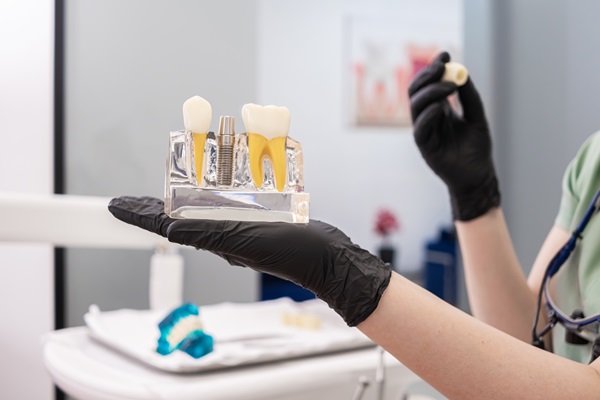Eating and Speaking With Dental Implants

Most people want to know how dental implants will affect the way they eat and speak. Many individuals would like to know if they would still chew comfortably after getting implants. Some dental implant patients worry that the implants could impact their daily living. If you want to know how eating and speaking would be like with dental implants, here are the details.
Eating with dental implants
An individual can eat right away after getting dental implants. Being mindful of the swelling and tenderness of the surgical area is important. This will persist for a few days after the procedure. Choosing to have liquids and soft foods will be ideal once the patient goes home. This will prevent the patient from chewing and stimulating the surgical site. Sticking to this diet is important for one to two days.
Eating a balanced diet is still possible with soft and liquid foods. Avoiding sugary treats, such as ice cream, is also important. Soup, shakes, fruit juices, flavored water, and broths are only some ideas. Mashed potatoes, flaky fish, and applesauce are also good sources of nutrients.
The patient must also learn to avoid irritants in the form of foods. The swelling and tenderness of the gums will worsen with these edibles. Staying away from acidic, hot, and spicy foods will keep the gums stable. Avoiding sticky and crunchy foods will prevent tissue trauma and implant loosening.
Healing will continue in the following weeks. By this time, the patient will start bringing in more foods back into the patient’s diet. The choices will include proteins, dairy, carbohydrates, and healthy fats. These are solid foods that do not need much chewing. Eggs and sweet potatoes can be part of the diet. Avoiding spicy, sour, and sticky foods is still important.
Eating the usual foods before getting dental implants is possible. This is when the implants have healed fully. The placement of the dental crown is a sign of returning to the patient’s normal diet. By this time, the patient will not have dietary restrictions anymore.
Speaking with dental implants
Adaptation is the keyword in learning to speak with dental implants. Part of this is to practice as much as possible. The more the patient speaks with the restorations, the more it will become organic. Hard work and patience are all the patient needs during this time.
Practicing speaking with dental implants will not be easy at first. Talking exercises can help the patient use the implants into speaking each word or sentence. The speech exercises also train the tongue to adjust to the changes in the patient’s bite. The normal speech patterns will reappear over time.
The tongue will learn how to maneuver through the new shape of the bite. The primary goal is to make the speech patterns natural. That way, the patient can speak well enough without worrying about how the words sound. The average time to reach this goal is 21 days after surgery.
Learning how to eat and speak with dental implants will take time and effort
Practice and patience are important aspects of learning how to adapt to dental implants. These restorations are foreign bodies. It is natural for your body to feel a little strange at first. In the end, the body will accept the implants. Your dentist can guide you through the techniques you need in eating and speaking with your implants.
Are you considering getting dental implants in the South Bend area? Get more information at https://www.michianafamilydental.com.
Check out what others are saying about our dental services on Google: Dental Implants in South Bend, IN.
Related Posts
Single-tooth dental implants are great options for people missing one or more teeth. Implants can help to improve talking and chewing. They can also enhance your appearance and improve your smile. Read on to learn about the various parts of a dental implant and what the implant procedure involves.An implant and crown can be used…
A missing tooth can create difficulties with eating, speaking, and smiling. Fortunately, with the help of a dental implants, a missing tooth can be easily replaced.Dental implants are small, titanium, screw-shaped prosthetics that take the place of teeth roots. It is important to distinguish that a dental implant itself does not actually replace the missing…
Considering dental implants? No one should have to live with missing teeth that cause cosmetic or oral health concerns, and dental implants help many replace missing teeth and regain confidence in their smile. Along with the cosmetic benefits, many find better oral health, improved function and other advantages with dental implants.There are many benefits dental…
Dental implants are highly recommended when it comes to replacing missing teeth. These oral prosthetics are surgically inserted into your jawbone, replacing the root that came out when you lost a tooth.Replacing lost teeth with dental implants requires minor oral surgery, and the implant is given up to six months to fuse with surrounding bone…
